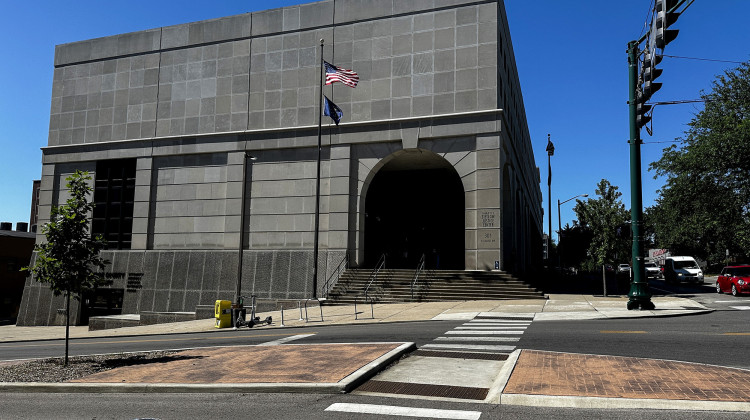
The trial in the latest legal challenge to Indiana’s near-total abortion ban wrapped up Friday.
IPB NewsThe trial in the latest legal challenge to Indiana’s near-total abortion ban wrapped up Friday with closing arguments from both sides.
Owen County Special Judge Kelsey Blake Hanlon will now weigh questions about specific elements of the law.
The near-total ban only allows an abortion if there is a “serious health risk” to the pregnant person; if there’s a lethal fetal anomaly up to 20 weeks post-fertilization; and in cases of rape or incest, but only up to 10 weeks.
The amended complaint says the definition of “serious health risk” is “unconstitutionally narrow.”
Lori Martin represents a group of abortion care providers that brought the amended suit. She said doctors need the flexibility to present the full scope of care so patients can choose the treatment that best fits their personal risk tolerance — and pointed to expert testimony.
“Dr. Caldwell was really crystal clear that women are going to die with the restrictions in SB 1, and that is a terrible outcome for Hoosier women.”
Dr. Amy Caldwell is one of the plaintiffs on the case, and is one of just two physicians in the state still providing procedural abortions. In closing arguments, the plaintiffs highlighted Caldwell's testimony, saying she has had to deny care because of the uncertainty the language of the law creates for providers.
Indiana Solicitor General James Barta represented the defense, and said the law is both reasonable and constitutional.
“[The exceptions] allow physicians the leeway to use the reasonable medical judgment to intervene to terminate a pregnancy, if that's actually necessary to save a life or prevent a serious health risk,” Barta said.
Several medical experts testified that the law uses language with no clear medical definition.
The defendants argued there was a reason to use non-medical language. In his closing argument, Barta said avoiding medical jargon allows laws to broadly cover risks. He said physicians know how to use the language.
Allyson Slater represented the plaintiffs, and said the law forces doctors to make “impossible decisions” about when a patient qualifies for care.
“Oftentimes those patients are facing really serious health risks,” Slater said. “But, the doctors feel afraid and don't want to make decisions that could jeopardize not only their medical license, but their liberty.”
While the defendants said the exception gives providers enough room, experts for the plaintiffs identified concerns about how this exception applies to patients who have a condition or a health risk that may become life-threatening in future — leading to doctors trying to guess when a patient becomes “sick enough” to qualify.
Indiana law also explicitly excludes “psychological or emotional conditions” from its definition of “serious health risks.”
The second part of the amended complaint also said the requirement for all abortions to be performed in hospitals or ambulatory outpatient surgical centers is also unconstitutional.
Barta said in his closing argument experts testified that severe complications of a surgical abortion can require tools only available at a hospital.
Melissa Shube is an attorney with Planned Parenthood Federation of America who represented the plaintiffs. She said the requirements limit access to care.
“People deserve to access care in their own communities,” Shube said. “And it's part of the reason that our challenge to the hospital requirement is so important.”
In addition to providing care in a hospital setting, Caldwell, the provider plaintiff, also has an active contract to provide abortion care with Planned Parenthood. She said she is no longer able to fulfill the contract due to the law's hospital requirement.
Caldwell also raised concerns around the cost and accessibility of care with the requirement. Caldwell said a procedural abortion in a hospital can cost around $8,000, while one at a clinic is around $500 — and the care is still safe outside of a hospital setting.
Court documents filed by the providers said more than 8,400 abortions were performed in Indiana in 2021. More than 98 percent were performed at abortion clinics — the rest were in hospitals.
They also said the near-total ban’s prohibition on abortion clinics makes it harder to receive legal care in Indiana. Court documents said “on information and belief, no hospital outside of Indianapolis is currently providing abortion care.” Many pregnant people in Indiana, who have legal access to abortion care, would have to seek it out-of-state.
The Indiana Supreme Court’s 2023 ruling on the near-total ban said it did not violate the state’s constitution. But, the court left the door open to challenges on the specifics — including this lawsuit.
Referencing that decision, the defendants criticized the lack of a specific scenario in the lawsuit. Barta said the decision was "clear" that challenges to the "health or life" exception need to have a specific circumstance to evaluate.
"It's not enough to imagine a hypothetical scenario in which someone might claim that the law infringes their constitutional rights," Barta said.
Planned Parenthood Great Northwest, Hawai‘i, Alaska, Indiana, Kentucky; All-Options; and an Indianapolis-based OB-GYN brought the lawsuit.
Abigail is our health reporter. Contact them at aruhman@wboi.org.
 DONATE
DONATE






 Support WFYI. We can't do it without you.
Support WFYI. We can't do it without you.